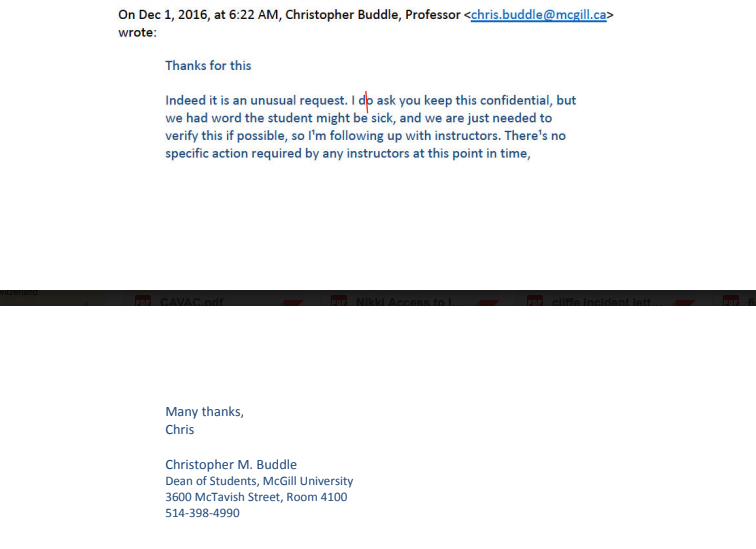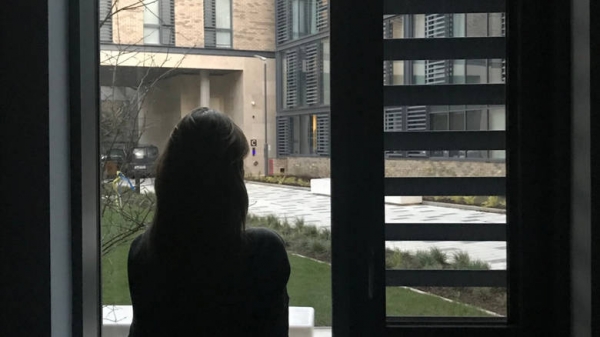Email threads shared with The McGill Tribune via the Access to Information (ATI) Act have revealed new details on how the McGill administration handled a recent case of sexual assault within the Faculty of Dentistry. As uncovered by the CBC in December 2017, a former student alleged that a dentist at the university sexually assaulted her during a mouthguard adjustment appointment in November 2016, and that McGill administrators discredited and excused her disclosure. In interviews with the Tribune, the survivor expanded on her complaints, explaining how administrators rehearsed with one another before meeting her and took action without her consent.
“Going into the meeting they had a very strict agenda”
As the CBC explained, the survivor and her former boyfriend met with Dean of the Faculty of Dentistry Paul Allison and Associate Provost (Equity and Academic Policies) Angela Campbell in January 2017 to discuss her case. The survivor deemed the meeting to be unsupportive and far from “survivor-focused.”
Emails the survivor obtained under ATI laws and shared with the Tribune proved that Campbell and Allison made a point of meeting with each other prior to their conversation with the survivor and her then-boyfriend.

While the topic of Allison and Campbell’s conversation is unknown, the survivor and her former boyfriend believe that they had practiced for the meeting.
“It seemed that going into the meeting [Campbell and Allison] had a very strict agenda that they were going to follow and that they knew what was going to happen from the beginning,” the survivor’s ex-boyfriend, who accompanied her to the meeting for emotional support, said. “[It was as though they said] ‘We’re going to hear the story and basically say we’ll look into it and do our best but we can’t let you know what’s going to happen at the end.’”
According to the survivor, Campbell and Allison’s questioning during the meeting felt as though they were attempting to undermine her claims. Her former boyfriend reiterated this sentiment to the Tribune.
“The whole tone of the meeting kind of seemed more like [Allison and Campbell] were trying to see if they really should be worried,” the former boyfriend said. “They were trying to [present] it as ‘we’re trying to help [the survivor],’ but it almost seemed as if they were more worried about ‘does she actually have a case against us?’”
To Ashraf Azar, who worked with the survivor on her case in collaboration with several lawyers, Campbell and Allison’s conversation with the survivor is part of a disconcerting trend of McGill prioritizing the quiet resolution of sexual assault cases over supporting survivors.
“With issues like these […] there has to be either some sensitivity to actually find a solution, and not to try and discredit the claim,” Azar said. “Because with the seriousness of what’s being claimed [you also want to avoid having] this same perpetrator possibly get away with it and do it to somebody else. So [Campbell and Allison] discussing, rehearsing, going on to basically collect information to some extent it seems, trying to find any holes or discredit [the survivor] at any point is troublesome.”
Allison and Campbell refused to comment on the case publicly due to the nature of the ongoing criminal investigation.
Administration contacting the survivor’s professors without her permission
Other email conversations showed that Dean of Students Christopher Buddle misinformed the survivor about the extent of his involvement in her case, in what she felt was a violation of her privacy. Buddle emailed the survivor on Feb. 6, 2017 to bring to her attention campus resources for sexual assault survivors, telling her that he knew little to nothing about the case.
“As the Dean of Students, I am typically notified when there are incidents involving students, and I did learn of the situation with you, although I do not know any details,” Buddle wrote in the email. “My utmost concern is your well-being.”

While the survivor acknowledged that Buddle’s initial email had a kind and supportive tone, she expressed concern over other emails she later received through the ATI request, showing that he took prior action without her knowledge or consent. On Nov. 30, 2016, and Dec. 1, 2016, two months before his introductory email to the survivor, Buddle requested at least two of the students’ professors to track her attendance, warning that she “might be sick.” He did not disclose any other information about the case and warned that it is a confidential matter.


“Buddle had not been directly in touch with me at all and to my knowledge, was not involved in the investigation,” the survivor said. “He did introduce himself to me a month later by email, stating that he was informed of my situation, however insisted that he did not know any details. In truth, he was not only involved in internal proceedings, but had actively engaged in the investigation as evidenced by the emails.”
Nonetheless, Buddle remains confident that contacting the students’ professors was necessary to monitoring her well-being following the assault.
“When the Office of the Dean of Students [ODOS] is concerned about a student or when concern has been raised about a student (e.g., health, wellness, or because someone reports them as missing), we will sometimes check in with instructors to see if they have had recent communications with students, or to ask if they can confirm that a student was attending class,” Buddle wrote in an email to the Tribune. “This is a part of our Office’s mandate around helping students in difficulty.”
Yet there is no line in the ODOS’ mandate explicitly verifying this directive. While the “Helping Students in Difficulty” subsection of the office’s mandate specifies that it will observe “academic indicators” that a student is in distress when necessary, it does not expressly require that the office alert students’ professors when they are unwell.
“Not everything is written down and we use a variety of tools to try to ensure our students feel supported and are well,” Buddle wrote.
The survivor saw this step to be a violation of her privacy and a mishandling of priorities.
“If [Buddle] was indeed concerned about my well-being, and not just my academic standing, he could have contacted me directly instead of checking my class attendance,” the survivor said. “I feel as though my privacy was clearly violated and still feel uncomfortable knowing that my professors were contacted without my permission.”
Some names and email addresses from these email threads have been redacted to protect the identities of those involved.









